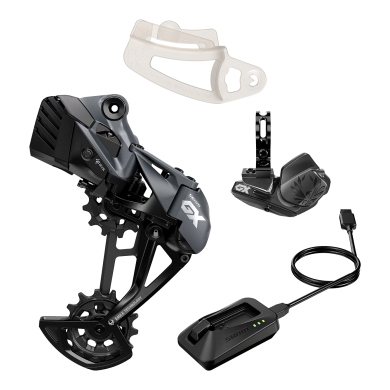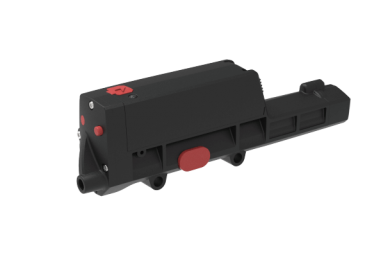Gyre
Well-known member
Product Image:



Product name: Wireless shifting: SRAM AXS / Cell-Cycling E-Link / Archer D1x
Price paid: 600-1000 USD / 260 USD / 390 USD
Score (out of 10): 8 (AXS) / 5 (Cell) / 4 (Archer)
Review: For anyone who may be interested in wireless electronic shifting, I've tried these three systems over the years and have been meaning to share a few words about their pros and cons.
One thing worth mentioning beforehand: While AXS seems to be a servo-actuated derailleur in a mechanically similar vein to DI2, Cell-Cycling and Archer appear to use a mini-jackscrew system that pulls on a mechanical cable to a traditional derailleur.
If you think electronic shifting is nonsense, then kindly just move along and have a nice day.
SRAM AXS Pros:
- Very polished software
- Easy setup
- Extremely fast derailleur actuation
- Extremely long battery life
- Available integration with Garmin via Connect IQ.
- Very simple micro adjust
- Very nice purpose-made shifter pod.
- Trailside battery swap is easy.
SRAM AXS Cons:
- GX is extremely heavy.
- All versions are extremely expensive.
- No option to tune gears individually.
- No options other than 12 speed.
- Remote pod and rocker switch can easily interfere with other grips and clamps (i.e. occludes more handlebar real estate than you'd expect).
- Rocker switch actuation is not as light or ergonomic as you might expect.
Cell Cycling – Ride Connected (cell-cycling.com)
Cell-Cycling Pros:
- Most affordable option.
- Will work with just about any mechanical derailleur, including front derailleurs.
- Supports anywhere from 3-12 "gears" (i.e. indexes) and this could be expanded with a software update.
- Very fast actuation, especially with v3 Elink.
- Each gear can be individually tuned.
- Trailside battery swap is extremely easy.
- Batteries charge with standard mini-USB connectors.
- Mini pod buttons have an excellent light touch (very much like clicking a mouse).
- Ergonomics of standard mini pod are pretty good when mounted vertically under the handlebar on a Lindarets Remount 22 (However, the basic mini pod is a zip-tie mount and therefore a bit loose. Have yet to try the MTB clamp on the Remount 22.)
Cell-Cycling Cons:
- Initial setup and calibration is a fiddly pain in the ass (Ride - adjust - ride - adjust - etc etc)
- Recently some issues with losing calibration (not sure about what's going on here, normally it's fine for years once the calibration gets dialed in. Possibly some kind of v3 issue going on.)
- No status available for remote battery on iOS (Android software is a little different and may be an exception)
- iOS app hasn't had a significant update in the last 4 years.
- Reliability issues on older E-links (I've had two failures during normal riding).
- Warranty situation very iffy. (Lots of warranty disclaimers peppered throughout website. Of my failures, one was granted by a local distributor, the other warranty request was denied by the manufacturer.)
- No option for trailside adjustment unless you pull out the phone app.
- Does not use even the barest Bluetooth security protocols (*Any* smartass with the app can access your shifter)
- If multiple Elinks are active, selecting the right one in the phone app is a matter of random chance.
- Ergonomics of mini pod are marginal when mounted directly to an MTB handlebar and extremely poor when zip tied to brake hoods on drop bars.
- You'll need to bring nail clippers and zip ties if you want to be prepared to change the mini pod battery on the trail.
Haven't used a D1x for a few years, but this is what I recall:
Archer Components Electronic Shifting for Every Bike
Archer D1x Pros:
- Will work with just about any rear mechanical derailleur, just about any number of speeds (not sure if 13 speed (Campy Ekar / S-Ride M700) is supported yet)
- Each gear can be individually tuned
- Non-proprietary batteries (Not sure if non-branded batteries will cause warranty problems).
- Nice ergonomic shifter pod available with light or firm touch buttons.
- Micro-adjust remote allows trailside adjustment without relying on phone app.
- DBR Remote option to integrate with TRP Hylex RS brakes.
- Customer support is accessible, friendly, and responsive.
Archer D1x Cons:
- Expensive. GX AXS isn't exactly affordable either but ~$400 without a derailleur for what amounts to an off-brand hack vs $600 for a complete system with a major brand is hardly a no-brainer.
- Batteries are very impractical to change on both remote and shifter (difficult to extract on shifter, and remote involves removing tiny screws that would be very easily lost if you fumble them on the trail).
- High latency and slow actuation after pressing a shift button*
- Phone app has weak Bluetooth discrimination (trying to make adjustments with the app anywhere where you might encounter a lot of other Bluetooth IDs can be a nightmare).
- Shift buttons feel the same, so it's possible to shift in the the wrong direction if your hand is somewhat out of position from usual.
- Light touch buttons seem a little too light (Button feedback is a little too subtle through gloves, but at least there is a firm option available - hopefully not *too* firm but haven't tried it.)
- No option for front derailleurs
*Archer now sells "Sprint" batteries that are claimed to trade off endurance for faster actuation speed. I haven't tried these and they do sound like a much needed improvement to shift speed, but I can't imagine they would improve the shift latency issue.


Product name: Wireless shifting: SRAM AXS / Cell-Cycling E-Link / Archer D1x
Price paid: 600-1000 USD / 260 USD / 390 USD
Score (out of 10): 8 (AXS) / 5 (Cell) / 4 (Archer)
Review: For anyone who may be interested in wireless electronic shifting, I've tried these three systems over the years and have been meaning to share a few words about their pros and cons.
One thing worth mentioning beforehand: While AXS seems to be a servo-actuated derailleur in a mechanically similar vein to DI2, Cell-Cycling and Archer appear to use a mini-jackscrew system that pulls on a mechanical cable to a traditional derailleur.
If you think electronic shifting is nonsense, then kindly just move along and have a nice day.
SRAM AXS Pros:
- Very polished software
- Easy setup
- Extremely fast derailleur actuation
- Extremely long battery life
- Available integration with Garmin via Connect IQ.
- Very simple micro adjust
- Very nice purpose-made shifter pod.
- Trailside battery swap is easy.
SRAM AXS Cons:
- GX is extremely heavy.
- All versions are extremely expensive.
- No option to tune gears individually.
- No options other than 12 speed.
- Remote pod and rocker switch can easily interfere with other grips and clamps (i.e. occludes more handlebar real estate than you'd expect).
- Rocker switch actuation is not as light or ergonomic as you might expect.
Cell Cycling – Ride Connected (cell-cycling.com)
Cell-Cycling Pros:
- Most affordable option.
- Will work with just about any mechanical derailleur, including front derailleurs.
- Supports anywhere from 3-12 "gears" (i.e. indexes) and this could be expanded with a software update.
- Very fast actuation, especially with v3 Elink.
- Each gear can be individually tuned.
- Trailside battery swap is extremely easy.
- Batteries charge with standard mini-USB connectors.
- Mini pod buttons have an excellent light touch (very much like clicking a mouse).
- Ergonomics of standard mini pod are pretty good when mounted vertically under the handlebar on a Lindarets Remount 22 (However, the basic mini pod is a zip-tie mount and therefore a bit loose. Have yet to try the MTB clamp on the Remount 22.)
Cell-Cycling Cons:
- Initial setup and calibration is a fiddly pain in the ass (Ride - adjust - ride - adjust - etc etc)
- Recently some issues with losing calibration (not sure about what's going on here, normally it's fine for years once the calibration gets dialed in. Possibly some kind of v3 issue going on.)
- No status available for remote battery on iOS (Android software is a little different and may be an exception)
- iOS app hasn't had a significant update in the last 4 years.
- Reliability issues on older E-links (I've had two failures during normal riding).
- Warranty situation very iffy. (Lots of warranty disclaimers peppered throughout website. Of my failures, one was granted by a local distributor, the other warranty request was denied by the manufacturer.)
- No option for trailside adjustment unless you pull out the phone app.
- Does not use even the barest Bluetooth security protocols (*Any* smartass with the app can access your shifter)
- If multiple Elinks are active, selecting the right one in the phone app is a matter of random chance.
- Ergonomics of mini pod are marginal when mounted directly to an MTB handlebar and extremely poor when zip tied to brake hoods on drop bars.
- You'll need to bring nail clippers and zip ties if you want to be prepared to change the mini pod battery on the trail.
Haven't used a D1x for a few years, but this is what I recall:
Archer Components Electronic Shifting for Every Bike
Archer D1x Pros:
- Will work with just about any rear mechanical derailleur, just about any number of speeds (not sure if 13 speed (Campy Ekar / S-Ride M700) is supported yet)
- Each gear can be individually tuned
- Non-proprietary batteries (Not sure if non-branded batteries will cause warranty problems).
- Nice ergonomic shifter pod available with light or firm touch buttons.
- Micro-adjust remote allows trailside adjustment without relying on phone app.
- DBR Remote option to integrate with TRP Hylex RS brakes.
- Customer support is accessible, friendly, and responsive.
Archer D1x Cons:
- Expensive. GX AXS isn't exactly affordable either but ~$400 without a derailleur for what amounts to an off-brand hack vs $600 for a complete system with a major brand is hardly a no-brainer.
- Batteries are very impractical to change on both remote and shifter (difficult to extract on shifter, and remote involves removing tiny screws that would be very easily lost if you fumble them on the trail).
- High latency and slow actuation after pressing a shift button*
- Phone app has weak Bluetooth discrimination (trying to make adjustments with the app anywhere where you might encounter a lot of other Bluetooth IDs can be a nightmare).
- Shift buttons feel the same, so it's possible to shift in the the wrong direction if your hand is somewhat out of position from usual.
- Light touch buttons seem a little too light (Button feedback is a little too subtle through gloves, but at least there is a firm option available - hopefully not *too* firm but haven't tried it.)
- No option for front derailleurs
*Archer now sells "Sprint" batteries that are claimed to trade off endurance for faster actuation speed. I haven't tried these and they do sound like a much needed improvement to shift speed, but I can't imagine they would improve the shift latency issue.
Last edited:


